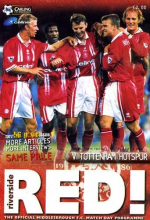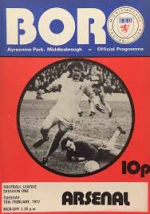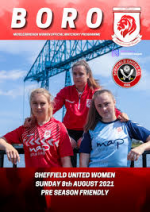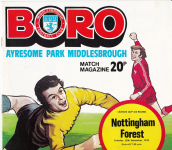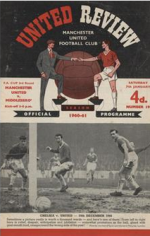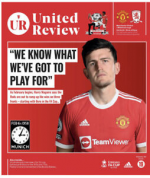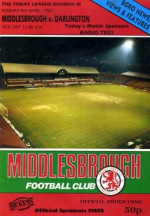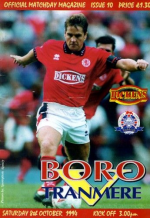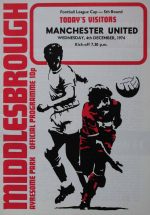You are using an out of date browser. It may not display this or other websites correctly.
You should upgrade or use an alternative browser.
You should upgrade or use an alternative browser.
* The unofficial "official" Boro v West Brom Match-day Thread and Programme *
- Thread starter r00fie1
- Start date
Caretaker1
Well-known member
Absolutely brilliant roofie , really enjoyed that and much appreciated , thank you .
r00fie1
Well-known member
THE BOY FROM BRAZIL:

 blog.fansbet.com
[Published 7th Oct 2021]
blog.fansbet.com
[Published 7th Oct 2021]

Bryan Robson pulled off some transfer coups during his time as boss of Middlebrough, but this one trumped them all as one of the most sought-after stars in world football arrived on Teeside for £4.75m in October, 1995.
In the mid-1990s, newly promoted Middlesbrough had money to burn and manager Bryan Robson was in the mood to spend.
Backed by local businessman Steve Gibson, Boro had been promoted to the Premier League and the chairman was more than happy to dig deep and put his money where his mouth was.
But rather than just seeking out a selection of journeymen and bit-part-players that are usually snapped-up when a club has a few quid to spend – they were to target the very best on the market.
Having joined from São Paulo, Juninho was paraded at the recently constructed Riverside Stadium in a huge statement of intent by the club – he was still young, hungry, in his prime and was keen to show the world what he could do – at Middlesbrough of all clubs.
The midfielder brought a style of football that had not been seen in the North East, and the fans grew to adore him. Having only just being promoted, Juninho boosted the club’s image not just across the country but around the world.

“Juninho signing for Middlesbrough was absolutely massive for the area,” Jonny from the The Boro Breakdown Podcast tells FansBet.
“It was a special time, a special era and I’m sure if you asked anyone on Teesside: ‘where were you when Juninho signed?‘ they’d be able to tell you for sure.
“That’s because the Brazilian player of the year had just signed for a newly promoted Middlesbrough Football Club.”
His skill level was something the club had rarely, if ever, seen, and playing in an attacking midfield role, he could light up even the dullest of matches.
He made his debut on 4 November 1995 at home to Leeds United, setting up the opening goal for Jan Åge Fjørtoft in a 1–1 draw while his first goal for the club came against Manchester City in a 4-1 win as the club eventually finished 12th on their return to the top-flight.
But it would be the 1996/97 season which would be as tumultuous as it was memorable for Middlesbrough and their supporters, with the little Brazilian playing a huge part.
That summer the skilful Brazilian Emerson joined his compatriot Juninho at Boro, followed by Champions League winner and Italian international Fabrizio Ravanelli, who signed from Juventus for £7 million.

Danish international Mikkel Beck came from Fortuna Köln, while Branco, capped 72 times by Brazil, later arrived to join what was to be known as the “United Nations” of football.
“The Brian Robson era for Middlesbrough will go down in folklore history across Teesside and maybe English football,” says Jonny.
“Middlesbrough quickly became everyone’s second team when we signed players like Juninho, Emerson and a Champions League winner in Fabrizio Ravanelli.
“Let me repeat that… Ravanelli, who just scored the Champions League fi nal winning goal and then a couple of weeks later signs for Middlesbrough. The players we were linked with like Batistuta, Roberto Carlos, Paul Ince, it was utter madness.”
Juninho would play 48 games, score 15 goals while also leading Boro to two cup final – both losses – and then relegation after a points deduction – breaking down and weeping on the pitch after drawing at Leeds when a win was needed to stay up.
“Although Boro could be fun to watch, we could barely defend,” admits Jonny.
“Bad decisions off the pitch and some unprofessionalism here and there was ultimately the downfall.
“Boro could have made something special even more special, but we will also be known as a team that got deducted -3 points and ultimately relegated.”

At the end of that campaign Juninho would leave Teeside and join Atletico Madrid but, in his two years at the Riverside, he had brought so much excitement and fun to the club that no one could begrudge him wanting to move on.
The pull of Teesside proved too much to resist, however, and he came back on loan for the 1999/2000 season and once again in 2002 – this time permanently.
The latter spell culminated in a 2-1 win over Bolton in the final of the 2004 League Cup – a trophy he later said meant more to him than winning the World Cup with Brazil.
As well as being one of the most popular players ever to play for Middlesbrough, Juninho is today seen as something of a pioneer of English football.
He made a move to England at a time when few Brazilians were prepared to do so, and set a precedent for future players over the decades to come.
Scoring 29 goals in 125 Premier League games, the little maestro proved that Brazilians can be a success in a league that seemed to clash with the Brazilian style and culture of football, with many future players following his example.

Had Juninho never proved to be such a hit, the likes of Philippe Coutinho and co. may never have braved the move and followed in his footsteps.
“Juninho is a god on Teesside. He always will be,” explains Jonny.
“He loves the area and we love him. He will go down as one of Boro’s best-ever players, as well as opening the door for a host of foreign stars to follow in his footsteps.
“Some of the foreign players we’ve had over the years has been incredible!
“In the ‘90s we had Marco Branca, Festa, Emerson, Ravanelli, Hamilton Ricard and a personal favourite just because he was a loose cannon and a complete liability – Vladimir Kinder.
“In the 2000s you’re looking at Mendieta, Viduka, Hasselbaink, Doriva.
“But Juninho’s legacy is everywhere and we still sing his name at games. Everyone knows who Juninho is and he is arguably the best Brazilian to grace English football.”
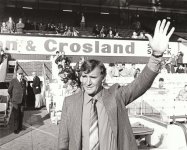
When Middlesbrough signed Juninho in 1995

Boy From Brazil: When Middlesbrough signed Juninho in 1995 - FansBet Blog
Juninho agreed to join Middlesbrough in October 1995 and his arrival sparked wild scenes at the Riverside.

Bryan Robson pulled off some transfer coups during his time as boss of Middlebrough, but this one trumped them all as one of the most sought-after stars in world football arrived on Teeside for £4.75m in October, 1995.
In the mid-1990s, newly promoted Middlesbrough had money to burn and manager Bryan Robson was in the mood to spend.
Backed by local businessman Steve Gibson, Boro had been promoted to the Premier League and the chairman was more than happy to dig deep and put his money where his mouth was.
But rather than just seeking out a selection of journeymen and bit-part-players that are usually snapped-up when a club has a few quid to spend – they were to target the very best on the market.
Having joined from São Paulo, Juninho was paraded at the recently constructed Riverside Stadium in a huge statement of intent by the club – he was still young, hungry, in his prime and was keen to show the world what he could do – at Middlesbrough of all clubs.
The midfielder brought a style of football that had not been seen in the North East, and the fans grew to adore him. Having only just being promoted, Juninho boosted the club’s image not just across the country but around the world.

“Juninho signing for Middlesbrough was absolutely massive for the area,” Jonny from the The Boro Breakdown Podcast tells FansBet.
“It was a special time, a special era and I’m sure if you asked anyone on Teesside: ‘where were you when Juninho signed?‘ they’d be able to tell you for sure.
“That’s because the Brazilian player of the year had just signed for a newly promoted Middlesbrough Football Club.”
His skill level was something the club had rarely, if ever, seen, and playing in an attacking midfield role, he could light up even the dullest of matches.
He made his debut on 4 November 1995 at home to Leeds United, setting up the opening goal for Jan Åge Fjørtoft in a 1–1 draw while his first goal for the club came against Manchester City in a 4-1 win as the club eventually finished 12th on their return to the top-flight.
But it would be the 1996/97 season which would be as tumultuous as it was memorable for Middlesbrough and their supporters, with the little Brazilian playing a huge part.
That summer the skilful Brazilian Emerson joined his compatriot Juninho at Boro, followed by Champions League winner and Italian international Fabrizio Ravanelli, who signed from Juventus for £7 million.

Danish international Mikkel Beck came from Fortuna Köln, while Branco, capped 72 times by Brazil, later arrived to join what was to be known as the “United Nations” of football.
“The Brian Robson era for Middlesbrough will go down in folklore history across Teesside and maybe English football,” says Jonny.
“Middlesbrough quickly became everyone’s second team when we signed players like Juninho, Emerson and a Champions League winner in Fabrizio Ravanelli.
“Let me repeat that… Ravanelli, who just scored the Champions League fi nal winning goal and then a couple of weeks later signs for Middlesbrough. The players we were linked with like Batistuta, Roberto Carlos, Paul Ince, it was utter madness.”
Juninho would play 48 games, score 15 goals while also leading Boro to two cup final – both losses – and then relegation after a points deduction – breaking down and weeping on the pitch after drawing at Leeds when a win was needed to stay up.
“Although Boro could be fun to watch, we could barely defend,” admits Jonny.
“Bad decisions off the pitch and some unprofessionalism here and there was ultimately the downfall.
“Boro could have made something special even more special, but we will also be known as a team that got deducted -3 points and ultimately relegated.”

At the end of that campaign Juninho would leave Teeside and join Atletico Madrid but, in his two years at the Riverside, he had brought so much excitement and fun to the club that no one could begrudge him wanting to move on.
The pull of Teesside proved too much to resist, however, and he came back on loan for the 1999/2000 season and once again in 2002 – this time permanently.
The latter spell culminated in a 2-1 win over Bolton in the final of the 2004 League Cup – a trophy he later said meant more to him than winning the World Cup with Brazil.
As well as being one of the most popular players ever to play for Middlesbrough, Juninho is today seen as something of a pioneer of English football.
He made a move to England at a time when few Brazilians were prepared to do so, and set a precedent for future players over the decades to come.
Scoring 29 goals in 125 Premier League games, the little maestro proved that Brazilians can be a success in a league that seemed to clash with the Brazilian style and culture of football, with many future players following his example.

Had Juninho never proved to be such a hit, the likes of Philippe Coutinho and co. may never have braved the move and followed in his footsteps.
“Juninho is a god on Teesside. He always will be,” explains Jonny.
“He loves the area and we love him. He will go down as one of Boro’s best-ever players, as well as opening the door for a host of foreign stars to follow in his footsteps.
“Some of the foreign players we’ve had over the years has been incredible!
“In the ‘90s we had Marco Branca, Festa, Emerson, Ravanelli, Hamilton Ricard and a personal favourite just because he was a loose cannon and a complete liability – Vladimir Kinder.
“In the 2000s you’re looking at Mendieta, Viduka, Hasselbaink, Doriva.
“But Juninho’s legacy is everywhere and we still sing his name at games. Everyone knows who Juninho is and he is arguably the best Brazilian to grace English football.”

r00fie1
Well-known member

Football stadiums and medical emergencies - what's the score? - Football Supporters' Association
There have been several high-profile incidents of fans requiring emergency health care in stadiums this season. But what healthcare is available for supporters at the match?
 thefsa.org.uk
thefsa.org.uk

Football stadiums and medical emergencies - what's the score? - Football Supporters' Association
There have been several high-profile incidents of fans requiring emergency health care in stadiums this season. But what healthcare is available for supporters at the match?
Football stadiums and medical emergencies – what’s the score?
Posted on 17th February 2022There have been several high-profile incidents of fans requiring emergency health care in stadiums this season. But what healthcare is available for supporters at the match? Joe Cosgrove, a Newcastle United fan and consultant in Anaesthesia and Intensive Care Medicine at the city’s Freeman Hospital, explains more…
Since stadium disasters such as Ibrox and Hillsborough there have been recommendations in place relating to the provision of medical cover at sporting events, and this has evolved under the guidance of the Sports Ground Safety Authority (SGSA).
Every few years they update their guidance, often referred to as the Green Guide. The recent version was published in 2018 and had major input from Events Medical Services in the north east. So what cover is provided on a typical matchday at St. James’ Park?
The incident at Newcastle v Spurs game in October provided a good example of how sudden collapse can be dealt with by trained bystanders and the immediacy of NHS paramedics who were able to delivery defibrillation (electric shock to the heart) within minutes. Having spectators who were able to provide basic life support and on-site professionals trained in using specialised equipment and drugs, enabled good care and treatment in a logistically, difficult environment.
---------------------------------------------------------------------------------------------------------------------------------------------------
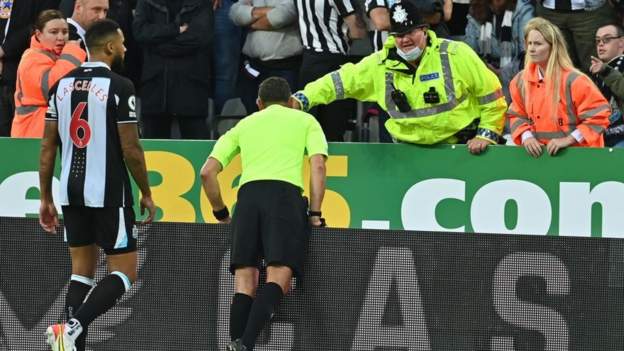
Fan 'stable' after Newcastle game halted
The supporter who collapsed, prompting Newcastle United's Premier League game against Tottenham Hotspur to be halted, is "stable and responsive" in hospital.
 www.bbc.co.uk
www.bbc.co.uk

Fan 'stable' after Newcastle game halted
The supporter who collapsed, prompting Newcastle United's Premier League game against Tottenham Hotspur to be halted, is "stable and responsive" in hospital.
Fan 'stable' after Newcastle-Tottenham game halted because of medical emergency
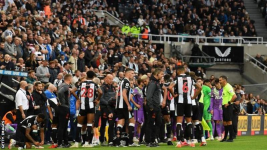
---------------------------------------------------------------------------------------------------------------------------------------------------
Medical cover in stadiums
In addition to four senior doctors, all of whom work fulltime in NHS hospitals, there are eight paramedics from North East Ambulance Service (NEAS) on duty for spectator care and 30-plus first responders for St. John Ambulance (SJA), a number of whom are senior nurses in north east hospitals.There are 16 defibrillators immediately available on a matchday, plus other equipment and drugs to deal with a variety of emergencies. There are also three NEAS Ambulances available for transport to hospital and additional NEAS vehicles already on the road. So, all in all, there is a large group of professionals (within the crowd) capable of dealing with acutely ill or injured spectators at every home game.
We don’t publicise our role because we’re not there to worry people but recent events around the country have led some to question matters about available personnel and facilities. This in turn may have created some concern for players and match officials. At Newcastle United we have personnel in excess of the basic requirements, and so do many other professional football clubs. Although the recommendations are based on crowd numbers, additional thought is given to crowd demographics and the nature of the event.
Heart attacks
The north east of England isn’t the healthiest part of the country and we have to consider such public health matters when planning. Furthermore, while we often joke about the stress of football, there is evidence from multiple countries that tense, high-stakes games can increase the risk of heart attack and stroke, especially in men.Studies include increased cardiovascular death in Dutch males with Holland going out of international competitions and increased heart attack rates in Germany during the 2014 World Cup. During the 1990s, there were increased cardiovascular deaths in men from West Yorkshire, Teesside, Wearside and Tyneside when one of Leeds, Middlesbrough, Sunderland or Newcastle lost at home.
Professional sporting organisations have a duty of care to anyone who falls acutely unwell or is injured at an event, hence the nature of the matchday medical team. It should also be emphasised that we’re there to assist in managing injuries and illnesses and have no facility to deal with long-standing or stable, chronic health problems that are best managed by GPs, pharmacists and community nurses.
----------------------------------------------------------------------------------------------------------------------------------------------------
Doctor saves collapsed fan at Middlesbrough match just months after saving Newcastle supporter

Doctor who saved Newcastle fan's life, helps collapsed supporter at Boro game | ITV News
Dr Tom Prichard, who works in A&E at North Tees Hospital, sprang into action when a Blackburn supporter collapsed during their clash with Middlesbrough. | ITV News Tyne Tees

---------------------------------------------------------------------------------------------------------------------------------------------------
A word for away fans
Anyone reading this who regularly goes to away games knows that away support is usually more boisterous and proportionately consumes more alcohol. We do therefore tend to see more injuries, rather than illness in this group of spectators.Many are quite gentle people who simply have a love for their team and they’ll often travel to every away game on a coach or in a mini-bus. Everyone will know them, but no one really knows anything about them.However, amidst the crowd are some very vulnerable individuals (adults as well as children) who often have significant physical and mental health problems.
If they fall seriously ill (as happens) there is often no one who can help provide health care professionals with any information about home address, next of kin etc. A little known but important group of people, that (more than the rest of us) warrant a duty of care.
Are fans unhealthier?
We’ve always cared for some severely ill people at football but what seems to be becoming apparent this season, across matches at multiple different clubs, is that ill spectators’ general health seems worse, and it may be that they’ve physically and physiologically deconditioned through various lockdowns. My colleagues who assess people’s fitness for major operations have commented on this too.There is also some recent evidence in the scientific journal Nature that some patients who have had COVID-19 infections that didn’t require admission to hospital have gone on to develop complications relating to breathlessness, damage to heart muscle, irregular heart-beats and the risk of angina/heart-attack.
It would be an unwise person to link everything to one thing but it’s clear that there are likely to be a number of factors mixing with each other that could increase the risk of acute illness in the stressful arena of a sports stadium.
I appreciate that this might be a bit left-field for the usual article but given the popularity of football and the health status of a lot of supporters, it’s worth more than just a fleeting thought.
Joe is a consultant in Anaesthesia and Intensive Care Medicine at Newcastle’s Freeman Hospital. In 2016 he received a £5,000 grant from the Hillsborough Family Support Group to form the National Events Medicine Advisory Group and promote best practice in medical care for spectators at sporting events. This article is dedicated to the late Cliffy Ahmed who died outside the Strawberry Pub in December 2016, after a 3-3 draw between Newcastle United and Manchester United.
r00fie1
Well-known member
[Published December 2017]
Its always gratifying to know there are plenty of "awards" Boro havent received - beaten to it by some of our "friends" in the football league.
6 of the Worst Premier League Winless Streaks Following West Brom's Run of 18 Without Victory

To say West Brom are having a bad season is an understatement.
The Baggies have gone a staggering 18 Premier League games without a win and their situation at the bottom is starting to look desperate, but believe it or not there are even worse winless runs in the English top flight.
With a win for the Baggies looking more unlikely week by week, here's six of the worst Premier League winless runs in a single season that West Brom should aim NOT to emulate:
6. Wolves (12 Games, 2011-12)
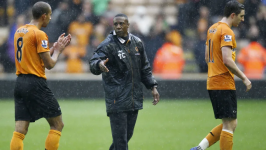
"Wolverhampton Wanderers's Interim Manager Terry Connor (C) prepares to shake hands with Wolverhampton Wanderers's Karl Henry in the rain at the final whistle as Wolverhampton Wanderers lose the match 0-2 and are relegated from the premier league during an English Premier League football match between Wolverhampton Wanderers and Manchester City at Molineux Stadium in Wolverhampton, England on April 22, 2012. AFP PHOTO/IAN KINGTON
Wolves may be bossing their way back to the top flight now, but fans of the Black Country club must still have nightmares about Terry Connor's interm tenure as boss at Molineux.
After sacking Mick McCarthy 26 games in, assistant manager Connor stepped up but failed to win a single league game as Wolves lost 10 of their final 12 games, drawing twice as they were miserably relegated, sitting rock bottom as they did. Shocking.
5. Nottingham Forest (16 Games, 1996-97)
The 1996-97 season looked good for Forest after an opening day 3-0 win over Coventry, but what was to follow set the tone for their season. Nine defeats and seven draws between August and December saw Frank Clark's side plummet down the table and eventually cost the manager his job.
The streak ended with victory over Arsenal, but it was too little too late as Forest were relegated in 20th position.
4. QPR (16 Games, 2012-13)
[IMG alt="Dejected Queens Park Rangers leave the pitch after losing 3-1 to Manchester United during their English Premier League football match at Old Trafford in Manchester, north-west England, on November 24, 2012. AFP PHOTO/PAUL ELLISRESTRICTED TO EDITORIAL USE. No use with unauthorized audio, video, data, fixture lists, club/league logos or “live” services. Online in-match use limited to 45 images, no video emulation. No use in betting, games or single club/league/player publications (Photo credit should read PAUL ELLIS/AFP/Getty Images)"]https://images2.minutemediacdn.com/...over/sport/5a44f360140033bc63000001.jpg[/IMG]
QPR owner Tony Fernandes clearly had a big vision for the Hoops by splashing out on big names such as Loic Remy, Esteban Granero and Stephane M'Bia.
However, nobody expected the humiliation as a 5-0 opening day defeat to Swansea led the shambolic Hoops to a 16-game winless streak which saw then collect just four points from their first 12 games.
Mark Hughes was sacked and even Harry Redknapp couldn't save this dreadful side, who went down as the league's basement side with just four wins, the first of those coming on match day 17.
3. Aston Villa (19 Games, 2015-16)
Yep. After winning their first game of the season, a dreadful Villa side full of rejects and second division players went half a season without winning, plummeting to the bottom of the table after struggling to do anything having sold Christian Benteke and Fabian Delph that summer.
Villa would have to wait until the new year to finally win, but it would be one of just three wins in the whole season as they went down in humiliating fashion with just 17 points and conceded over 70 goals.
If West Brom fail to beat Arsenal on Sunday, they will indeed equal their Midlands rivals on the grand total of 19 winless games.
2. Sunderland (20 Games, 2002-03)
Sunderland are the only side in Premier League history to break the record for lowest points total twice,
Having spent most of the season in the bottom three and already sacked one manager, Sunderland failed to win a single one of their final 20 games of the season.
Mick McCarthy took over roughly halfway through that run, but the damage was firmly done as the Black Cats went down in embarrassing fashion - having not tasted a league win since the 15th December. To put that into perspective; Christmas, Valentines Day, Easter and a May bank holiday passed. And they still didn't win once in that time.
1. Derby County (32 Games, 2007-08)
Considering how well Derby are doing now, [if only you knew then what we know now....] Rams supporters must do everything in their mind to forget this tragic season. Favourites for the drop before a ball was kicked, Derby were optimistic after claiming their first win of the season with a 1-0 home victory over Newcastle in mid September. Fans at Pride Park certainly enjoyed it, because it was the only time they would taste a win that season.
32 games would pass, and both Billy Davies and new manager Paul Jewell would oversee a Derby side that would lose 25 times, and draw seven of those 32.
Officially the worst team in the league's history with just 11 points, Derby conceded four or more in a game seven times in that winless run as they limped out of the top flight as a laughing stock.

Last edited:
hewielewie
Well-known member
I usually like your posts Roofie but you seem to have gone a bit off tangent with this thread.
r00fie1
Well-known member
Hows that Hewie?I usually like your posts Roofie but you seem to have gone a bit off tangent with this thread.
Jonny Ingbar
Well-known member
Huge game tonight, a defeat and other results against us would see us drop as low as 10th.
breakthewallsdown
Well-known member
What's with the copy and pasting of random articles
breakthewallsdown
Well-known member
Main sky gameIs this red button tonight?
r00fie1
Well-known member
Which ones?What's with the copy and pasting of random articles
hewielewie
Well-known member
The one about Juninho and "Are fans more unhealthy?"Which ones?
r00fie1
Well-known member
Hello.The one about Juninho and "Are fans more unhealthy?"
Today is Juno`s birthday - and there is always at least one article in each match-day thread which is uniquely of interest to Boro fans.
There is always a "commonality" of articles - related in this case to West Brom and their recent history.
Tied into every threed is always an article on a "hot" topic: this week relates to the player who experienced a head injury at the Leeds - Man Utd game - hence the article about head injuries from the Supporters Forum.
Recent articles have also included Police attacks on fans at Stoke, Racism in Football, homophobia and similar topics. I trust us fans to decide for ourselves what is important: sometimes being contentious can provoke considered thought and help us go outside the bubble of just football. Having just played Bristol, the article about "Living Beyond Our Means" ties in nicely and again highlights the issues of Financial Fair Play - which effects all clubs.
Far from just "random" articles - there is a formula to maintain interest and vary presentation for each match-day thread: you may notice today, the small images of former Boro players and Managers in the bottom left-hand corner of most segments?
This is designed to be of interest to all fans - a reminder to those of us who remember them with fondness - and an inquisitiveness in those who maybe want to know who they are. It is different to the football
and the --------UTMB-------- , which not only takes time to replicate, but can become predictable. In order to maintain interest the presentation needs to be tweaked deliberately.
There are the mainstays - Stats / Tables/ Record / Form - and inserts along the way which may be of interest. Readers require an element of knowing the minimum they can expect. Their as always an intro at the beginning and match reviews. I try to inject elements of irony and humour - sometimes a little too subtle for some.
I always break up long texts to enable people to focus more effectively. we have people with sight issues who access this thread - people with autism - epilepsy - neuro diverse and those who find the standard 15 font difficult to read. Thats also why the format is generally the way it is presented.
I`f you or anyone has requests for inclusions in future thread - all will be considered. The usual forum is always available of course.
In order to appeal to the widest possible audience this thread will never satisfy everyone.
But thats fine.
That shows that readers are engaging and taking ownership.
Back in a short while.
Thanks for your comments.
Genuinely appreciated

Last edited:
breakthewallsdown
Well-known member
An article about winless runs in the premier league published 5 year ago..
TheBlueButterfly
Well-known member
Good on you for doing what you do, but what is the relevance for tonights game with most of that? Keep it short and sweet Roofie son! 
r00fie1
Well-known member
Hi,An article about winless runs in the premier league published 5 year ago..
you will see above my response to Hewie.
General interest segements are important - because the thread is not exclusively about the one match. Other issues - such as the thread about Boro being relegated - are relevant during these unusual times.
People read this thread at different times - some dip in and out. Others read selectively and others end-to-end.
If you`re not interested in a particular topic - thats fine.
But no one insists that everyone reads everything.
Its like any post / thread / magazine - style presentation: some are liked more than others. Some peole get involved because they have a particular interest.
Its up to the individual.
So far, the overwhelming majority of feedback has been positive.

